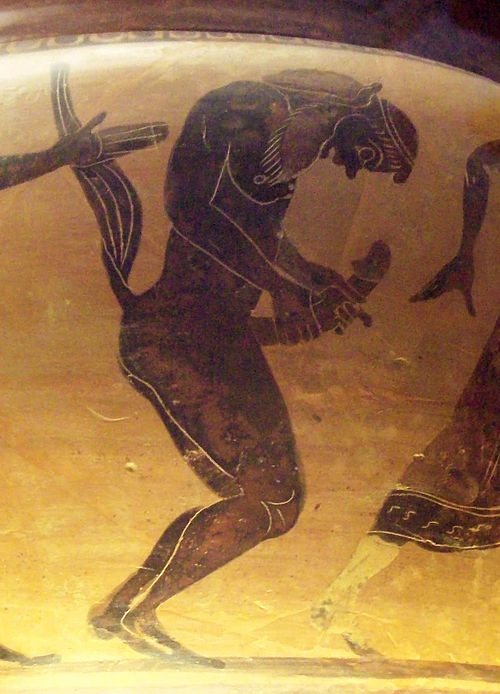Satyrnoun
(Greek mythology) A male companion of Pan or Dionysus with the tail of a goat and a perpetual erection.
Satyrnoun
(Roman mythology) A faun.
Satyrnoun
A lecherous man.
Satyrnoun
Any of various butterflies of the nymphalid subfamily Satyrinae, having brown wings marked with eyelike spots; a meadow brown.
Satyrnoun
(obsolete) The orangutan.
Satyrnoun
A sylvan deity or demigod, represented as part man and part goat, and characterized by riotous merriment and lasciviousness.
Satyrnoun
Any one of many species of butterflies belonging to the family Nymphalidæ. Their colors are commonly brown and gray, often with ocelli on the wings. Called also meadow browns.
Satyrnoun
The orang-outang.
Satyrnoun
man with strong sexual desires
Satyrnoun
one of a class of woodland deities; attendant on Bacchus; identified with Roman fauns
Satyr
In Greek mythology, a satyr (Greek: σάτυρος, translit. sátyros, pronounced [sátyros]), also known as a silenus or silenos (Greek: σειληνός seilēnós [seːlɛːnós]), is a male nature spirit with ears and a tail resembling those of a horse, as well as a permanent, exaggerated erection.
Centaurnoun
(Greek mythology) A mythical beast having a horse's body with a man's head and torso in place of the head and neck of the horse.
Centaurnoun
(astronomy) An icy planetoid that orbits the Sun between Jupiter and Neptune (also capitalised).
Centaurnoun
(chess) A chess-playing team comprising a human player and a computer who work together.
Centaurnoun
A fabulous being, represented as half man and half horse.
Centaurnoun
A constellation in the southern heavens between Hydra and the Southern Cross.
Centaurnoun
(classical mythology) a mythical being that is half man and half horse
Centaurnoun
a conspicuous constellation in the southern hemisphere near the Southern Cross
Centaur
A centaur (; Ancient Greek: κένταυρος, kéntauros, Latin: centaurus), or occasionally hippocentaur, is a creature from Greek mythology with the upper body of a human and the lower body and legs of a horse.Centaurs are thought of in many Greek myths as being as wild as untamed horses, and were said to have inhabited the region of Magnesia and Mount Pelion in Thessaly, the Foloi oak forest in Elis, and the Malean peninsula in southern Laconia. Centaurs are subsequently featured in Roman mythology, and were familiar figures in the medieval bestiary.






































